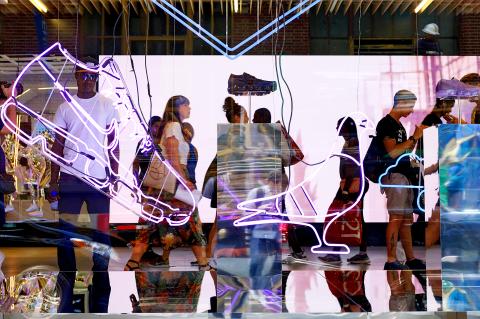Nike Inc wants to be more nimble on its feet.
The sneaker maker on Thursday said that it plans to focus on its best-selling sneakers, slash the number of styles it offers and sell more shoes directly to customers online as part of a restructuring in which it is also to cut about 1,400 jobs.
The Beaverton, Oregon-based company said the layoffs represent about 2 percent of its 70,000 employees worldwide.

Photo: AFP
It declined to provide additional details about the cuts.
Nike said the moves would help it offer products to customers faster as it is facing increasing competition from smaller brands and premium labels.
Another problem: The running and basketball shoes Nike is famous for might be outdated.
More people are choosing fashion over function, with sales of classic sneakers industry-wide last year climbing 26 percent, an NPD Group Inc report said.
Meanwhile, sales of performance running sneakers were flat and sales of performance basketball sneakers dropped, the report said.
“Nike missed the fashion shift away from performance basketball to retro,” NPD sports industry analyst Matt Powell said. “They still have not caught up.”
Adidas AG, whose casual Stan Smith shoes have become popular again, has made a push to increase sales in the US.
The German company last month said that first-quarter revenue in North America jumped 31 percent from a year earlier.
On the high end, Neiman Marcus last week told investors that sneakers, with an average retail price of US$360 per pair, have become a significant business as shoppers focus on a more casual lifestyle.
Nike, known for its swoosh logo, is also to make its sneaker selling apps available in more countries at a time when online sales mean many big retailers and department stores are closing stores.
“We’re getting even more aggressive in the digital marketplace,” Nike CEO Mark Parker said.
Nike said a main focus would be the 12 key cities in 10 countries that it expects to represent more than 80 percent of its projected growth through 2020.
Those cities are New York, Los Angeles, London, Paris, Mexico City, Tokyo, Seoul, Shanghai, Beijing and Milan, Italy.

Taiwanese suppliers to Taiwan Semiconductor Manufacturing Co. (TSMC, 台積電) are expected to follow the contract chipmaker’s step to invest in the US, but their relocation may be seven to eight years away, Minister of Economic Affairs J.W. Kuo (郭智輝) said yesterday. When asked by opposition Chinese Nationalist Party (KMT) Legislator Niu Hsu-ting (牛煦庭) in the legislature about growing concerns that TSMC’s huge investments in the US will prompt its suppliers to follow suit, Kuo said based on the chipmaker’s current limited production volume, it is unlikely to lead its supply chain to go there for now. “Unless TSMC completes its planned six

Intel Corp has named Tasha Chuang (莊蓓瑜) to lead Intel Taiwan in a bid to reinforce relations between the company and its Taiwanese partners. The appointment of Chuang as general manager for Intel Taiwan takes effect on Thursday, the firm said in a statement yesterday. Chuang is to lead her team in Taiwan to pursue product development and sales growth in an effort to reinforce the company’s ties with its partners and clients, Intel said. Chuang was previously in charge of managing Intel’s ties with leading Taiwanese PC brand Asustek Computer Inc (華碩), which included helping Asustek strengthen its global businesses, the company

Power supply and electronic components maker Delta Electronics Inc (台達電) yesterday said second-quarter revenue is expected to surpass the first quarter, which rose 30 percent year-on-year to NT$118.92 billion (US$3.71 billion). Revenue this quarter is likely to grow, as US clients have front-loaded orders ahead of US President Donald Trump’s planned tariffs on Taiwanese goods, Delta chairman Ping Cheng (鄭平) said at an earnings conference in Taipei, referring to the 90-day pause in tariff implementation Trump announced on April 9. While situations in the third and fourth quarters remain unclear, “We will not halt our long-term deployments and do not plan to

TikTok abounds with viral videos accusing prestigious brands of secretly manufacturing luxury goods in China so they can be sold at cut prices. However, while these “revelations” are spurious, behind them lurks a well-oiled machine for selling counterfeit goods that is making the most of the confusion surrounding trade tariffs. Chinese content creators who portray themselves as workers or subcontractors in the luxury goods business claim that Beijing has lifted confidentiality clauses on local subcontractors as a way to respond to the huge hike in customs duties imposed on China by US President Donald Trump. They say this Chinese decision, of which Agence